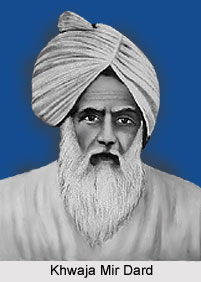 Khwaja Mir Dard, one of the three major poets of Delhi School (other two are of course - Mir Taqi Mir and Sauda), was born in the year 1721. The trio were often considered as the pillars of classical Urdu ghazal.
Khwaja Mir Dard, one of the three major poets of Delhi School (other two are of course - Mir Taqi Mir and Sauda), was born in the year 1721. The trio were often considered as the pillars of classical Urdu ghazal.
Philosophy of Khwaja Mir Dard
First and foremost, Dard was a mystic, a typical and prominent number of the Naqshbandi Mujaddidi order, and the head of the Muhammadi path (Tariqah Muhammadiyah, a Mujaddidi offshoot) in Delhi. He also regarded the phenomenal world as veil of never-ending reality, and this life as term of banishment from genuine home. Dard had a mystical temperament which he of course inherited from his father - Khwaja Muhammad Nasir Andalib, who himself was a poet or mystical saint and also founder of Muhammadi Path.
Education of Khwaja Mir Dard
Khwaja Mir Dard did not get any formal or institutionalized education. Whatever education he received was from informal settings. He learned Persian and Arabic, as well as Sufi lore. As a matter of fact, Dard also developed a deep love of music, possibly through his association with singers and qawaals who frequented his father`s house. He also renounced earthly pleasures at the age of 28 and also led a life of humility and piety.
Poetry of Khwaja Mir Dard
The special appeal of Dard lies not in the mysticism, but in his aptitude to transmute this mysticism into poetry, and to present transcendental love in terms of human and earthly love. Although he has also written ghazals that are unambiguously mystical in their intent, his best couplets can be read at both the secular and spiritual levels, and are, for this reason, acceptable to all and sundry.
Drad in addition also had written ghazal that deals a patently sensuous and earthly love, and deserve to be classed with the best poetry of this kind. Khwaja Mir Dard mainly excels in short ghazals of about seven to nine verses, written in comparatively short measures. His style is simple, musical and natural his content, thoughtful and thought-provoking. His poetry includes a collection of Urdu ghazals and a divan in Persian.
Dard`s Persian prose works are extensive, consisting of the Ilm ul Kitab, a 600+ page metaphysical work on the philosophy of the Muhammadi path, and the Chahar Risalat, collections of more than a thousand mystical aphorisms and sayings



















